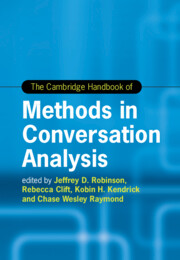Book contents
- Frontmatter
- Contents
- List of Tables
- List of Contributors
- Part I Introduction
- Part II Points of Departure
- 2 Conversation-Analytic Methods of Data Collection
- 3 Collecting Interaction Data in the ‘Lab’ versus the ‘Field’: Rationale, Ramifications, and Recommendations
- 4 Working with Data I: Field Recordings
- 5 Multimodal Transcription as Process and Analysis: Capturing the Audible and Visible
- 6 Discovering a Candidate Phenomenon
- 7 Data Sessions
- Part III Collections
- Part IV Evidence
- Part V Avenues into Action
- Part VI Situating and Reporting Findings
- Part VII Looking Forward
- Appendix I Jeffersonian Transcription Conventions
- Appendix II Multimodal Transcription Conventions
- Index
6 - Discovering a Candidate Phenomenon
from Part II - Points of Departure
Published online by Cambridge University Press: 06 December 2024
- Frontmatter
- Contents
- List of Tables
- List of Contributors
- Part I Introduction
- Part II Points of Departure
- 2 Conversation-Analytic Methods of Data Collection
- 3 Collecting Interaction Data in the ‘Lab’ versus the ‘Field’: Rationale, Ramifications, and Recommendations
- 4 Working with Data I: Field Recordings
- 5 Multimodal Transcription as Process and Analysis: Capturing the Audible and Visible
- 6 Discovering a Candidate Phenomenon
- 7 Data Sessions
- Part III Collections
- Part IV Evidence
- Part V Avenues into Action
- Part VI Situating and Reporting Findings
- Part VII Looking Forward
- Appendix I Jeffersonian Transcription Conventions
- Appendix II Multimodal Transcription Conventions
- Index
Summary
How do we find a candidate phenomenon in interactional data? In this chapter we examine a number of methods for doing so. We make an initial distinction between observations and discoveries. Drawing on the cumulative experience of a number of conversation analysts, we provide some guidelines to help analysts develop observations into discoveries. We then investigate a range of approaches to identifying action: the heart of CA method. This includes an overview of Schegloff’s analytic ‘keys’ as a way into data. All of these approaches have the radically inductive methods of CA at its core. However, there are other starting points, and we discuss some of these alternative ways of bringing CA methods to bear on the data of interaction.
- Type
- Chapter
- Information
- The Cambridge Handbook of Methods in Conversation Analysis , pp. 143 - 171Publisher: Cambridge University PressPrint publication year: 2024

